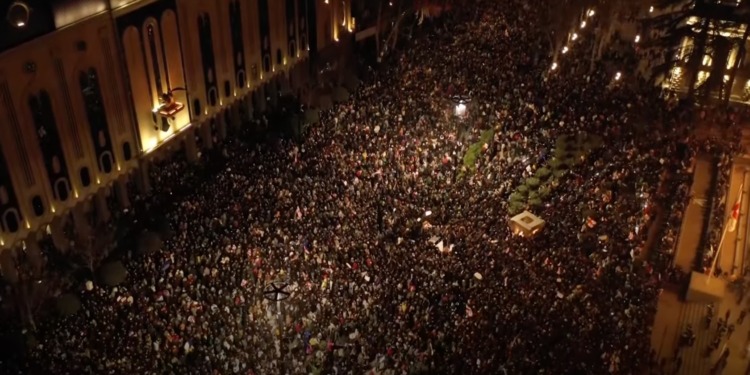Thousands of protestors have swarmed the streets of Tbilisi, Georgia’s capital city, in protest of the controversial draft law on Transparency of Foreign Influence, a bill mimicking Putin’s Foreign agent Law of 2012, passing the first reading in Parliament.
The Law entails the following: Non-government groups and media outlets will have to register as “agents of foreign influence” if they receive at least 20% of their funding from abroad. Failure to comply with the registration would lead to considerable fines.
Furthermore, the parliamentary majority endorsing the bill has proposed a new version of the Law that would further target individuals and other associations while raising the potential punishment to 5 years in prison, in addition to hefty fines.
The aim is to further suppress civil freedom in Georgia by “labelling and stigmatising” associations or media that do not follow the party’s ideology and narrative.
The timing of the proposed bill is crucial. Georgia was told it would receive EU membership candidate status this year, if it adhered by the EU’s principles. As such, it is mandatory for Georgia to make sufficient progress on 12 pro-EU reforms, targeting democracy, the rule of law, transparency and human rights.
The Law on Transparency of Foreign Influence however, would go in direct opposition to the required reforms on media and civil freedom, all the while increasing political polarisation. More to the point, it’s not compliant with EU standards and international law obligations.
The discrepancy between the draft law and the EU standards is not surprising considering how heavily the legislation was influenced by Putin’s regime.
Russia is trying to keep Georgia dependent on it. Putin aims to govern Georgia through his marionette politician Bidzina Ivanishvili.
Today in Tbilisi people are fighting to throw off Russian chains.
We stand with the people of Georgia. pic.twitter.com/hRbIrlmQOr
— Anton Gerashchenko (@Gerashchenko_en) March 8, 2023
Although the Georgian Dream Party, which vigorously supported the bill, argues that the law will increase transparency, its underlying purpose is to facilitate the government’s control of civil society.
Prime Minister Irakli Gharibashvili maintains that the legislation mimics American laws from the 1930s, an argument used by Putin when implementing his own foreign agent law in 2012.
Fundamentally, the purpose of the bill is to bury associations in paperwork, all while metaphorically stamping the scary words “foreign agent” on their front door.
NGOs are already subject to 10 different laws, and the finance ministry is granted full access to associations’ accounts and funding. So why does the Party find it necessary to brand associations as “foreign agents”?
Protests and political polarisation
As an ex-Soviet state, the connotation of foreign influence in domestic affairs is portrayed in a very negative light, which motivated first Putin and now the Georgian Dream to push such litigation.
Russia’s role in Georgian politics has been very significant, even after the fall of the Soviet Union. In 2008, the Russo-Georgian War demonstrated Putin’s aspiration to control Georgia as a Pro-Russian state.
Yet, Georgia has still successfully taken significant steps towards adhesion to the EU, which has only made the Kremlin resentful, especially after Russia’s invasion of Ukraine.
Considering the progress made by Georgia to join the EU, the retrograde elements of the bill have polarised the parliament and stirred anger among citizens.
Related Articles: Bloody Politics: One Year of War in Ukraine | World Still United to End the War in Ukraine | The Dichotomy of the Protest Wave: One Year of War Around the World
Strong sentiments also emerged within political parties, where the Law has caused a monumental divide.
On March 6, a brawl took place in Parliament. Opposition politician Irakli Pavlenishvili blamed former Georgian Prime Minister Bidzina Ivanishvili, head of Georgian Dream, for the unacceptable bill. Ivanishvili famously made his fortune in the banking and metals industry in Russia, making him one of the richest men in Georgia as well as an avid Russian supporter.
Over 85% of the people support the Euro-Atlantic negotiations. Despite this, the majority of the Parliament seems to be working to satisfy the wishes of Ivanishvili.
Former Prime Minister Giorgi Gakharia has insisted that the country could “tear itself apart” because of this bill. He believes that every ten years, revolutionary change occurs in the country’s politics. The system is designed to provoke this change, as the division in the country between the “Russian agents” and the “U.S. Agents” is irreparable.
Georgian President Salome Zourabichvili has promised to support the population by vetoing the proposal as well. She called the bill “something dictated by Moscow”.
Colossal protests have taken place for the past two nights.
On March 7, thousands of Georgians took to the streets of Tbilisi in protest of the Law. Protestors chanted “No to Russian Law”, waving EU flags and clashing with the police. The scale of the protest became even more staggering the next day as the government called special forces to control the crowd through tear gas and water cannons.
The tremendous uproar of the population shook the parliament and forced Georgian Dream’s hand.
The bill will be abandoned “unconditionally.” Yet, the public is still planning to protest tonight as citizens have lost any confidence in the Party and wish for a European future for Georgia.
EU’s Foreign Policy Chief, Josep Borell, had been very critical of the bill, calling it a “very bad development for Georgia and its people” and “incompatible with EU values in standards”. The EU delegation in Georgia welcomes the move to drop the law while encouraging Georgia to adopt more “Pro-EU reforms”.
The scale of the demonstrations has given the people a crucial voice in the country’s politics. Yet, despite the government’s promises, protesters will still rally in the streets tonight to ensure that the Parliament will act as promised and in full transparency.
Editor’s Note: The opinions expressed here by the authors are their own, not those of Impakter.com — In the Featured Photo: Protest on March 8 in Tbilisi. Featured Photo Credit: Screenshot from Radio Liberty.










